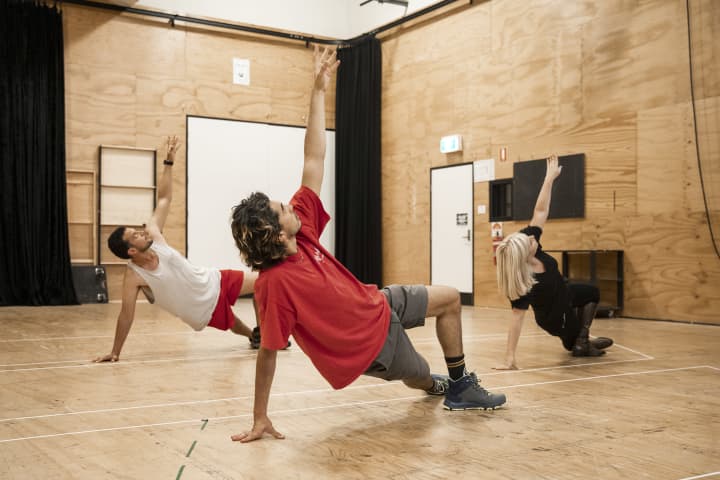Louris van de Geer is a Melbourne-based playwright and theatre maker whose writing often experiments with contemporary theatrical form. As a longtime fan of Elizabeth Jolley’s writing, van de Geer’s approach to adapting the author’s psychological thriller The Well was to maintain the novel's Rorschach test-like essence ... and its spookiness.
When did you first encounter Elizabeth Jolley’s novel, and what were your first reactions to it? What does the novel mean to you?
I distinctly remember discovering Elizabeth Jolley’s work. I was 18. I had just finished high school. I felt lost. I was volunteering at the Melbourne Writers Festival and I bought one of Elizabeth Jolley’s novels from the festival bookshop. I was obsessed with it. I remember sitting outside the venue (when I was meant to be working!), reading. I think she is an extraordinary writer who is able to capture an aspect of female experience and female desire in a way that makes one feel less alone. I cannot define exactly what this experience is, which I think it part of why her work is so good. It is not easily defined but it captures something that feels incredibly recognisable.
‘I have always been interested in work that explores interior states and that leaves space for more than one interpretation of the story ... Elizabeth Jolley is a master at this.’
The Well is an interesting novel. It is deceptive. It tricks you into thinking it is a standard thriller, but really it is an excavation of a female psychological landscape. And it doesn’t leave you with an easy answer. I have always been interested in work that explores interior states and that leaves space for more than one interpretation of the story. Work that is experienced a bit like a Rorschach test – you see what you want to see, or what is on your mind at a particular time. Elizabeth Jolley is a master at this, and I have tried to maintain this essence in the stage adaptation.
And when did you first decide to adapt the novel? How did the process first come about?
I was at a time in my creative life when I felt like I had all these feelings and interests that I wanted to explore but I couldn’t find a frame for them. I tried, as a thought experiment, to think about what I could adapt for the stage, and Elizabeth Jolley’s The Well was something that immediately came to mind.
I mentioned to Sarah Goodes that I was interested in adapting the novel and she, having separately been interested in adapting Australian literary works, was excited by the idea. We were both interested in working collaboratively on an adaptation too, so we have been working on it together from the get-go. It is a novel that is ripe for the stage – whilst it is very internal and psychological, it has the thriller storyline that keeps the plot moving forward, whilst also being very experiential and mysterious, which in my opinion is what the theatre should be like!
Have you seen the film adaptation?
I haven’t! I hadn’t seen it before I decided to adapt the novel and I deliberately haven’t seen it since. I think theatre is so different to film, so I didn’t want to be influenced by anything I might see in the film, although I’m sure it is very good!
‘Whilst I imagined a very visual version of this play, I think a staging like this is really interesting in the way it emphasises listening, and collective listening ... There is an element of campfire ghost story to this novel so I think a staging like this can really emphasise the spookiness of the story, and get under the skin in a way that a traditional staging maybe couldn’t.’
You worked on the play as part of the NEXT STAGE Writers’ Program – can you talk a bit about the importance of this program?
I think this program has been essential in the development of this work. As I mentioned before, Sarah and I wanted to work more collaboratively than the way a traditional commission would work, and the NEXT STAGE program has really helped this happen. We have been able to hold a number of creative developments throughout the process – the first one with not even a line of script written! – and this has really helped in finding a version of this novel that would work for the stage.
What are you most looking forward to from seeing, and hearing, the play staged in this way?
I am just so excited to be in a theatre again! And whilst I imagined a very visual version of this play, I think a staging like this is really interesting in the way it emphasises listening, and collective listening, which is what we come to the theatre to experience. I think it will be really spooky. There is an element of campfire ghost story to this novel, so I think a staging like this can really emphasise the spookiness of the story, and get under the skin in a way that a traditional staging maybe couldn’t.
Artists were some of the hardest hit by the events of 2020, while the rest of the world relied on their work to get through it. Can you talk a bit about the importance of art in our lives, in the best of times as well as the worst?
I just don’t know how I would’ve survived lockdown without art. I watched so much TV! I watched so many films! I missed the theatre so much! For me, I seek out art as a way to not feel alone, and I create it as a way of framing things I find inexplicable. I think we need that now more than ever. And we need the power of imagination to be able to find hope when things are unrelentingly grim. I think it is a really interesting time now. We are lucky in Australia to be coming out of the worst (hopefully!) of COVID – what will we want to see, think about, experience?
What did you miss most about life and work during 2020?
I missed strangers. I missed being able to wander. I missed seeing the whole of a person’s face. I missed the feeling of there being a sense of movement, and a structure to time. I found it incredibly hard to work on anything, as if there was nothing holding me up – my thoughts would just swim around, reverberating off the walls.
This question makes me think of something Elizabeth Jolley said in an interview once:
“I think people are on the edge of something, and some people who even seem to be in the thick of things are on the edge in another sense … I think that what I really see is the individual, and the particular aspect of loneliness, or fear, that that individual has, which puts her immediately on a fringe of some sort. And I think that most people are like that, though they do have a little structure that keeps them going. If the structure is taken away, then they really become very much on the fringe.”
What are you most looking forward to with the return of live performance?
I am so excited about being around bodies and seeing bodies on stage doing things. It still feels weird to think about. I think it will take some adjusting to, but I am ready for a return to the physical world.
The staged reading of The Well is on at Southbank Theatre from 29–30 January 2021
The Well was commissioned through MTC’s NEXT STAGE Writers’ Program with the support of the Donors, Foundations and Organisations of MTC’s Playwrights Giving Circle.
Published on 25 January 2021





